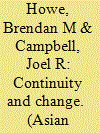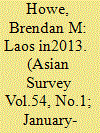|
|
|
Sort Order |
|
|
|
Items / Page
|
|
|
|
|
|
|
| Srl | Item |
| 1 |
ID:
118417


|
|
|
|
|
| Publication |
2013.
|
| Summary/Abstract |
In this article, we address four common, often contradictory misconceptions concerning Japanese foreign and security policy. First, Japan's strategic "normalization" is dangerous. Second, Japan is incapable of having a "normal" policy. Third, Japan is about to become "normal." Fourth, foreign and security policy under the Democratic Party of Japan (DPJ) will differ radically from what it was for fifty years under the Liberal Democratic Party (LDP). We contend that Japan is not a threat; that it has a security policy, but not one that fits well with Western models; and that Japan's security policy is changing, gradually not radically, and is not becoming just like the West's.
|
|
|
|
|
|
|
|
|
|
|
|
|
|
|
|
| 2 |
ID:
143895


|
|
|
|
|
| Summary/Abstract |
Good governance is an essentially contested concept. In Asian countries, economic efficiency and macro-economic projects have predominantly been pursued with the aim of promoting national, aggregate measurements of development. Hydroelectric power generation projects have played a central role in the national planning of several regional states as part of an attempt to achieve these goals. Even by their own terms of reference, however, hydroelectric power projects have at most a mixed record of success, and are increasingly criticized with regard to their negative impact on the environment, and upon vulnerable groups. The government of Malaysia has embraced the “developmental state” model, and this is best illustrated by governance initiatives and resource exploitation in the East Malaysian states of Sarawak and Sabah and their respective “development corridors”. Sarawak’s Corridor of Renewable Energy (SCORE) is the most visible sign of Malaysia’s macro-economic hydroelectric development focus, as Sabah’s corridor focuses on trade, investment, and tourism. This article takes a critical perspective towards good governance, emphasizing that it should function in the interests of all society, but in particular the most vulnerable. It therefore addresses the impact of Malaysian hydroelectric development policies on one of the most vulnerable sections of Malaysian society, the indigenous peoples of Sarawak. The findings cast doubt on the validity of continued prioritization of hydroelectric dam construction as a cornerstone of government energy and development policy.
|
|
|
|
|
|
|
|
|
|
|
|
|
|
|
|
| 3 |
ID:
175403


|
|
|
|
|
| Summary/Abstract |
Western liberal democracy is in crisis. At the same time, since the end of the Cold War, new regions of the world and actors have risen to prominence. Contemporary discourse emphasizes, in particular, the rise of East Asia (including the Northeast and Southeast Asian sub-regions) and the empowerment of middle powers. This Special Issue of Asian Affairs: An American Review looks at the extent to which mid-sized East Asian states with significant democratic heritage embody hope for the liberal democratic project, and also the challenges they face. Furthermore, it considers how the analysis of the mode of interaction between state, economy and society allows a determination of the democratic conditions of any given country. The articles in this Special Issue originate from a project supported by the Asia Pacific department of the Friedrich Ebert Stiftung (FES) exploring regional interdependencies of democratization in Asia. This introduction explores the theoretical framework of the project and elaborates further on case selection.
|
|
|
|
|
|
|
|
|
|
|
|
|
|
|
|
| 4 |
ID:
119101


|
|
|
|
|
| Publication |
2013.
|
| Summary/Abstract |
The year 2012 saw rapid economic growth, resource development, and a young, dynamic population starting to change the face of Lao public life. The governing Lao People's Revolutionary Party was quick to claim across the board success. There remain, however, significant caveats: success has been moderate, and growth has come with human costs.
|
|
|
|
|
|
|
|
|
|
|
|
|
|
|
|
| 5 |
ID:
130189


|
|
|
|
|
| Publication |
2014.
|
| Summary/Abstract |
In 2013 Laos joined the World Trade Organization, economic growth was over 8%, and graduation from least-developed country status by 2020 remains achievable. But its human development index of 0.543 remained below the regional average. Macro development projects still threaten the vulnerable. The abduction of a prominent campaigner and repatriation of North Korean refugees highlighted human rights challenges.
|
|
|
|
|
|
|
|
|
|
|
|
|
|
|
|
| 6 |
ID:
070709


|
|
|
|
|
| Publication |
2006.
|
| Summary/Abstract |
The North Korean Human Rights Act of 2004 was an attempt under U.S. domestic law to provide aid and humanitarian relief to and broadcast support for those perceived as suffering from the actions of the North Korean regime. It also aimed to transform the regime and contribute to the peaceful reunification of the Korean peninsula (in a process similar to that which had occurred as a result of the Helsinki Accords with regard to Eastern Europe). However, contrary to serving its avowed objectives, the act contributes little to enhance human rights protection in North Korea and to instigate regime transformation. Rather, the act is more likely to endanger strategic relations in Northeast Asia.
|
|
|
|
|
|
|
|
|
|
|
|
|
|
|
|
|
|
|
|
|